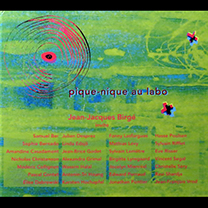December 10, 2020
pique-nique au labo - Jean-Jacques Birgé
 Label: GRRR & (bandcamp)
Label: GRRR & (bandcamp)
Catalog #: GRRR 2031-32
Country: France
Release Date: October 14, 2020
Media: cdx2 & digital files
bandcamp.com entry
discogs.com entry
A version of this review is also available in French and here as well.
When we were introduced to Vijay Iyer's thoughts on the "embodied cognition" of music in his doctoral dissertation1, we placed this concept within a spectrum of musical responses. At one end of the spectrum is a purely physical response. Many of us unconsciously begin a physical movement, such as tapping toes or bobbing heads, in response to the stimulus of rhymthic music. Next on the spectrum is an emotional response. Again, many listeners can relate to the notion of "sad songs", which describe an emotional response to a piece of music, usually constructed with the intent to induce precisely such a response. So the idea of music inducing a cognitive response is a natural extension in this spectrum, since physical movement, emotions and intellectual ideas are all processed through the same biological organ, namely the brain and the associated central nervous, endocrine and muscular systems.
One common mechanism used in music to induce an intellectual response is the manifestation of musical freedom in improvisational collaborative ensembles, in which each musician is not obligated to conform to a tightly specified set of notes and chords, but is instead invited to participate in a more individualized contribution to the collective sound. This approach to music is easily associated with egalitarian concepts. As such, it has historically been associated in the United States of America with the Civil Rights movement, because it places the musicians on equal footing, irrespective of relative individual history and fame. This sort of music is individually ego-less while making a collective demand, because it advocates for social action to rise to the egalitarian ideal.
Receptivity to embodied cognition can require active listening. What a listener hears in music is largely what one brings to the music. This can occur on both an intellectual and emotional level. Perhaps counter-intuitively, we suggest that in the case of non-idiomatic improvisation, the intellectual appreciation of music is more superficial than the emotional response. Such a statement may seem backward because many people attend concerts (at least in non-pandemic times) and respond on a non-intellectual level to the music. However, from my own experience, the ability to appreciate intellectually the music of an artist that has eschewed traditional conventions of melody and rhythm develops gradually as the ear is trained, but once established as a principle of active listening, it has broad application. Recognition of the artistic risk taken in musical endeavors by artists previously unknown to me proves sufficient impetus to make me a willing receptacle to the music, though it may not resonate at any so-called deeper level.
This additional level of resonance moves beyond a perfunctory acknowledgement of the merit of the music to a desire to be moved by the music to action, even if the action is only to listen to the music again. This response is due as much to the audio characteristics of the music as it is to the listener's non-audio relationship to the music. For example, at the Poison Pie Publishing House, we are inordinately fond of the music of the British non-idiomatic improvisational guitarist, Derek Bailey, but our appreciation is driven equally by the esthetic appeal of the physical sounds generated by the combination of human being and musical instrument as by the cultural attitudes espoused by Bailey and represented by his music. His musical life as a tireless expression of self-education is captured in his statement, "My whole life story is really a strenuous attempt to push back this colossal ignorance I've always carried around with me,"2 as is his humility and irreverent humor. To unrepentantly insist that the world can accommodate this music though it generates neither great acclaim nor excessive wealth is a message that also resonates with us. The world is what we make of it and a role model that extols the ability to move beyond the propaganda of a dominant monoculture, in which worth rests solely on the quantity of listeners and breadth of popular acclaim, is a prize beyond value.
Of course, Derek Bailey is only one example we call to mind to make our point. There are countless practitioners residing in the cultural margins who fight against the narrowing of human experience by their persistence to engage in acts that they alone may deem worthwhile. These thoughts expressed in the four paragraphs above emerged as we listened to Jean-Jacques Birgé's pique-nique au labo. It is a collection of twenty-two tracks of improvisation featuring Birgé collaborating in various duos and trios with twenty-eight other improvisers. The material was recorded over the course of the past decade. We hear fragments measured in a few minutes of presumably larger bodies of improvisation. Each piece is distinguished not only by personnel but by the instrumentation and the individual approach toward improvisation that each member of the ensemble brought to the meeting.
As the liner notes explain, "It is about playing to meet and not the opposite as is usual", i.e. meeting to play.
After preliminary listening to the music, I sensed that writing this review would aid me in finding how this music spoke to me. I had to get beyond a collage of disparate pieces, recorded over the course of a decade then assembled in a compilation, to hear the continuous theme. This is, in one layman's opinion, just another amazing example of the "embodied cognition" of creative music. It served as a powerful introduction to the work of Jean-Jacques Birgé and his conspirators.
References:
- Vijay Iyer, Microstructures of Feel, Macrostructures of Sound: Embodied Cognition in West African and African-American Musics, Ph.D. Dissertation, University of California, Berkeley, 1998.
- Ben Watson, Derek Bailey and the Story of Free Improvisation, Verso, London, 2004, p. 55.

